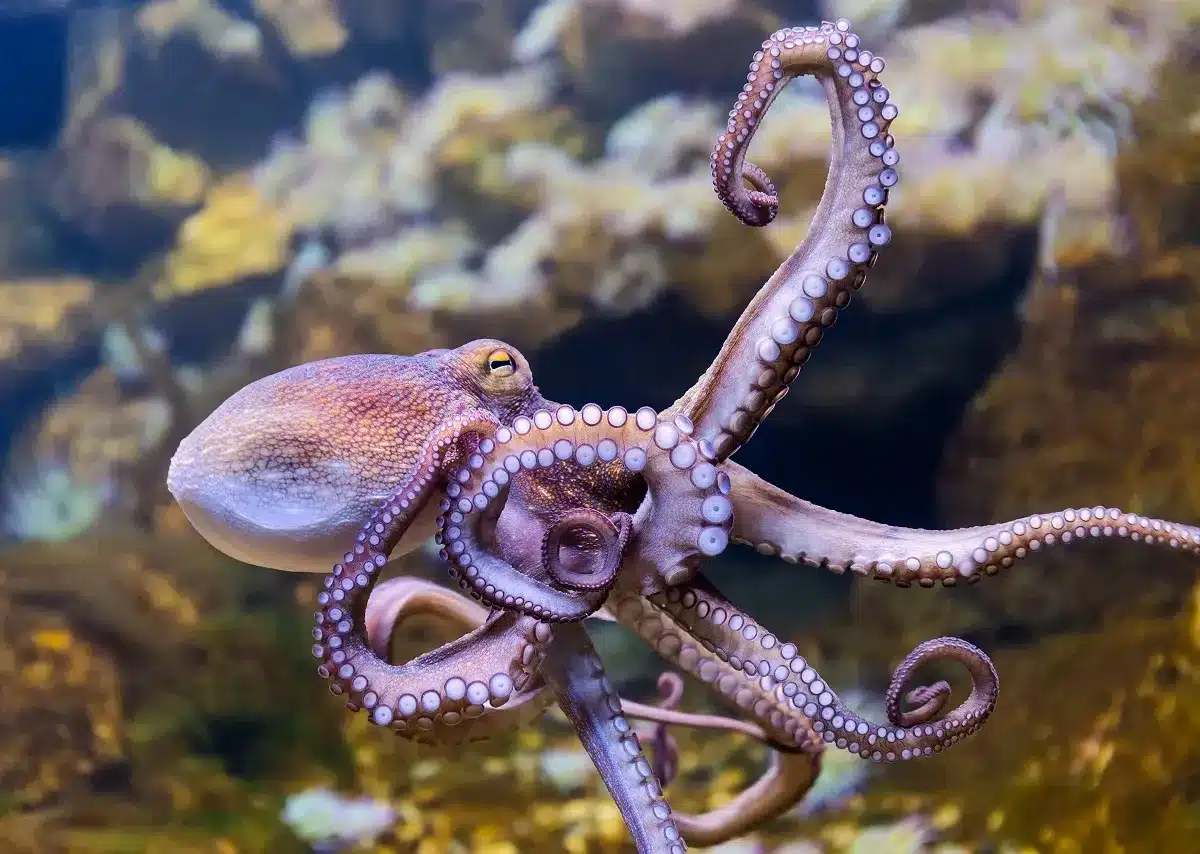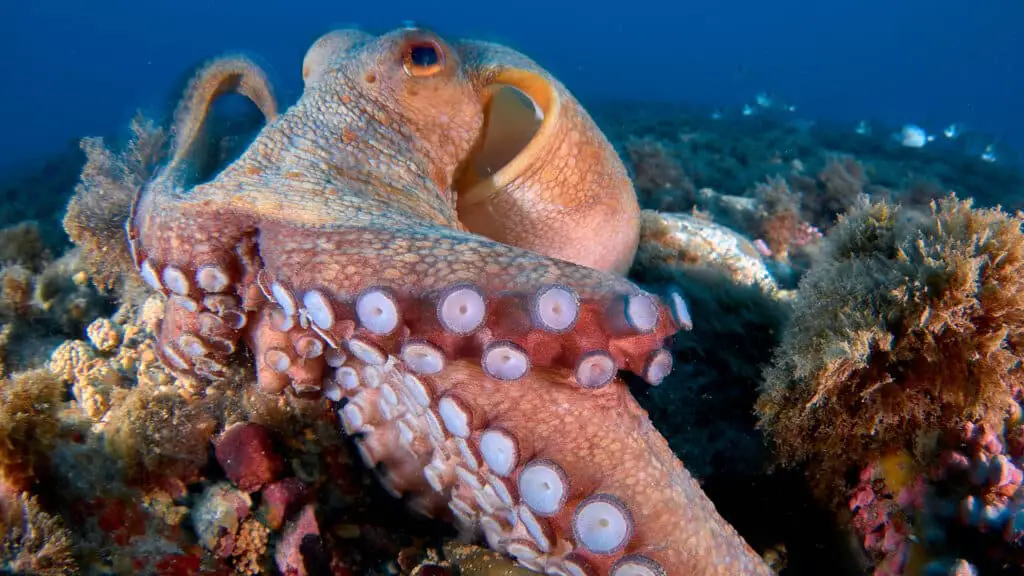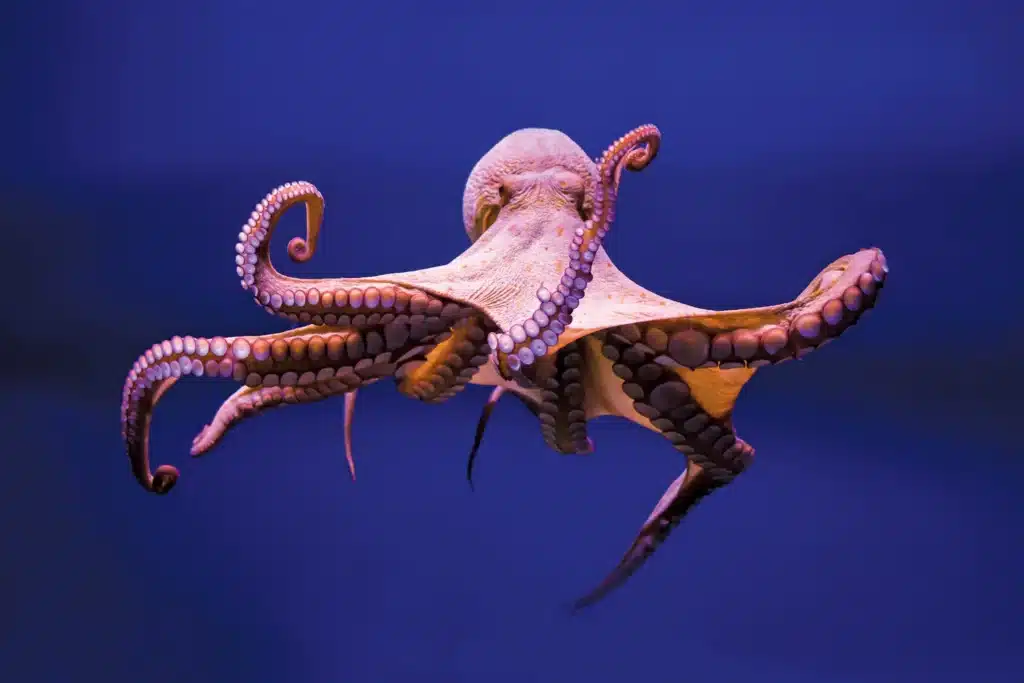Are Octopus Smarter Than Dogs

Introduction
Are Octopus Smarter Than Dogs: Among the myriad of species inhabiting our planet, two captivating creatures have recently emerged as prime candidates for comparative cognitive analysis: the octopus and the dog. While they occupy vastly different branches of the animal kingdom, their unique attributes and behaviors have led researchers to ponder whether octopuses might, in some aspects, outsmart dogs.
Octopuses, enigmatic denizens of the deep, belong to the mollusk phylum, a group not typically associated with high intelligence. However, these creatures exhibit a remarkable range of behaviors that defy their evolutionary lineage. From complex problem-solving and intricate camouflage abilities to astonishing feats of memory, octopuses have been dubbed “alien” and “otherworldly” due to their cognitive prowess.
On the other hand, dogs, our loyal companions for millennia, represent a lineage of highly adaptable and trainable mammals. Their ability to learn commands, navigate human social cues, and even perform tasks like guiding the visually impaired showcases their impressive cognitive abilities.
Through a multidimensional lens, we seek to understand the unique strengths and limitations of these two extraordinary species, shedding light on the complex tapestry of animal intelligence.

What is smarter an octopus or a dog?
Dogs, alas, are not on the list. 1. Octopuses are by far the world’s smartest invertebrates; they carry out complex tasks like opening a jar, have excellent long-term memory, and an astonishing ability to learn new skills from the moment they are born. 2.
Determining whether an octopus is smarter than a dog, or vice versa, is a challenging task because intelligence varies across different species and depends on the criteria used for assessment. Octopuses exhibit remarkable problem-solving skills, learning capabilities, and intricate behaviors such as camouflage. Their cognitive abilities are particularly well-suited to their solitary and ever-changing underwater environments.
Dogs, on the other hand, display social intelligence, making them adept at understanding and communicating with humans and other dogs. Their ability to learn commands, perform tasks, and navigate complex social dynamics contributes to their reputation as highly intelligent animals.
Octopuses excel in aquatic problem-solving, while dogs excel in social cooperation. Attempting to declare one species universally smarter than the other oversimplifies the complexities of animal cognition. Instead, appreciating their unique intelligences allows us to marvel at the incredible diversity of cognitive abilities that have evolved in the animal kingdom, each finely tuned to the demands of its ecological niche.
Are octopus the smartest animal?
No. 9 in our list of world’s smartest animals is the octopus, one of the smartest creatures in the sea. This animal is still poorly understood, but scientists are constantly discovering new and impressive abilities. Octopi play, solve problems, navigate through mazes and have respectable short-term memories.
Labeling octopuses as the absolute smartest animals is a matter of perspective and criteria for measuring intelligence. Octopuses are undoubtedly among the most intellectually captivating creatures in the animal kingdom. Their brain-to-body mass ratio is remarkable, and they have displayed astonishing problem-solving abilities, complex learning processes, and even the capacity to use tools in some instances.
However, it’s essential to remember that intelligence varies widely across species, and different animals excel in various domains. While octopuses are celebrated for their cognitive adaptability, other animals like dolphins, chimpanzees, elephants, and certain bird species also exhibit exceptional intelligence in distinct ways.
Thus, declaring any single species as the “smartest” oversimplifies the complex spectrum of animal intelligence. Rather, understanding and appreciating the unique cognitive abilities of various animals remind us of the diverse ways in which species have evolved to thrive in their specific ecological niches.
How intelligent are octopus compared to other animals?
Yet octopuses are extremely intelligent, with a larger brain for their body size than all animals except birds and mammals. They are capable of high-order cognitive behaviors, including tool use and problem-solving, even figuring out how to unscrew jar lids to access food.
Comparing the intelligence of octopuses to that of other animals is a fascinating exploration of the diversity of cognitive abilities across the animal kingdom. Octopuses, with their complex behaviors and remarkable problem-solving skills, occupy a unique place among marine creatures.
They exhibit exceptional adaptability, often making clever escapes, using tools, and displaying an astonishing array of camouflage techniques. These abilities stem from their highly developed nervous system, including a centralized brain and intricate neural networks in their arms.
Octopuses excel in underwater problem-solving and are masters of their aquatic environment. However, if we look at different domains of intelligence, we find that other animals showcase their own remarkable abilities. Dolphins, known for their social complexity and communication skills, demonstrate a different facet of intelligence.
Ultimately, intelligence is multifaceted, and each species has evolved its unique set of cognitive abilities tailored to its specific environment and ecological niche. Octopuses are undeniably intelligent creatures, but their intelligence is just one facet of the rich tapestry of cognitive diversity found throughout the animal world.
Do you agree that octopuses are some of the smartest animals why or why not?
Octopuses are incredibly intelligent animals! They recognize individual human faces, have their own unique personalities, use tools, solve puzzles, play, and can disentangle complex problems. Even though they are invertebrates, they are now being studied on the same level as vertebrates like dolphins and chimpanzees.
Whether octopuses are among the smartest animals is a subject of ongoing scientific inquiry and debate. Octopuses are undeniably fascinating creatures, boasting a host of remarkable cognitive abilities that distinguish them within the animal kingdom. Their problem-solving skills, complex learning processes, and astonishing behaviors like camouflage and escape artistry all attest to their intelligence.
However, it’s important to note that intelligence is a multifaceted concept, and its evaluation can vary depending on the criteria and context. Octopuses exhibit exceptional intelligence in their underwater realm, but this doesn’t necessarily make them the smartest across all domains.
Other animals, such as dolphins, elephants, chimpanzees, and certain bird species, showcase their own forms of intelligence. Dolphins’ social complexity and communication skills, elephants’ remarkable memory and emotional depth, chimpanzees’ tool use and problem-solving abilities, and the problem-solving skills of certain bird species all illustrate different facets of intelligence.
Declaring octopuses as the smartest animals overall oversimplifies the diversity of cognitive abilities found in the animal kingdom. Instead, we should appreciate the uniqueness of each species’ intelligence, shaped by their evolutionary history and adapted to their specific environments and challenges.
What are the smartest things octopus have done?
They’re capable of lifting four times their body weight …. They change color.” But they can also distinguish between colors as well as open screw-top jars and child-proof bottles and use tools. Octopuses’ intelligence is so great that they even have the capacity to feel bored.
Octopuses have demonstrated a remarkable array of intelligent behaviors that have captivated scientists and observers alike. Some of the smartest things octopuses have done include:
- Complex Problem-Solving: Octopuses have been observed solving intricate puzzles, such as opening containers with latches and manipulating objects to reach their prey. This showcases their ability to adapt to new challenges and environments.
- Camouflage Mastery: Octopuses are unparalleled masters of camouflage. They can change the color, texture, and even shape of their skin to blend seamlessly with their surroundings, effectively becoming invisible to predators and prey alike.
- Escape Artists: Octopuses are notorious for their Houdini-like escape abilities. They can squeeze through tight spaces, unscrew lids, and navigate mazes to flee from enclosures. Their escapes highlight their problem-solving skills and adaptability.
- Tool Usage: Some octopus species have been observed using tools, such as coconut shells, to create protective shelters. This behavior suggests a level of ingenuity and planning rarely seen in the invertebrate world.
- Memory: Octopuses exhibit both short-term and long-term memory. They can remember solutions to problems and learn from their experiences, allowing them to adapt and improve their strategies over time.
- Social Learning: While they are generally solitary creatures, octopuses can also learn from observing other octopuses, indicating a degree of social learning.
These examples demonstrate the multifaceted intelligence of octopuses, showcasing their adaptability, problem-solving abilities, and capacity for learning and memory. Their unique set of cognitive skills has earned them a well-deserved reputation as some of the most intelligent and enigmatic creatures in the animal kingdom.
Can octopuses form bonds with humans like dogs do?
Octopuses and dogs have vastly different social structures and evolutionary backgrounds, which influence their capacity to form bonds with humans. Dogs are renowned for their ability to form deep emotional connections with humans, often regarded as companions and even family members. Their domestication history has led to behaviors like loyalty, affection, and attachment, making them excellent at forming bonds with people.
In contrast, octopuses are typically solitary animals in the wild, with few social interactions beyond mating and territorial disputes. However, there have been anecdotal accounts of octopuses showing curiosity and interaction with humans, especially in captivity. Some octopuses have been known to recognize individual keepers and display signs of interest, such as reaching out to touch them or even playing with objects offered by their caretakers.
While these interactions may suggest a level of connection, it’s essential to approach them with caution. Octopuses’ behaviors can be complex and may not equate to the same depth of bonding that dogs exhibit. The extent to which octopuses can form genuine emotional bonds with humans remains a subject of scientific inquiry and debate.
While octopuses may display some level of interaction and curiosity toward humans, the nature and depth of these connections differ significantly from the strong, emotionally-driven bonds that dogs often form with their human companions.
Which species is more trainable, octopuses, or dogs?
When it comes to trainability, dogs unquestionably have the upper hand over octopuses. Dogs have been selectively bred for thousands of years for specific purposes, which often include obedience and trainability. This long history of domestication has resulted in breeds that readily respond to human commands and cues.
Dogs can be trained to perform a wide range of tasks, from basic obedience commands like sit and stay to complex tasks such as search and rescue, herding, and assisting individuals with disabilities. Their ability to understand and interpret human gestures, vocalizations, and body language makes them exceptionally trainable.
In contrast, octopuses, while highly intelligent in their own right, are not domesticated animals. Their solitary and independent nature, combined with their lack of a social structure akin to dogs, makes them inherently less trainable. Octopuses are primarily self-reliant and rely on their problem-solving abilities to navigate their environments.
While some limited training and conditioning experiments have been conducted with octopuses in captivity, their level of responsiveness and ability to learn specific tasks falls far short of what can be achieved with dogs. Dogs’ long history of cooperation and coevolution with humans has made them unparalleled in the realm of trainable animals.
Can octopuses recognize individual humans like dogs can?
Octopuses possess a level of visual acuity that allows them to distinguish between various objects and organisms, including humans. However, their recognition abilities differ significantly from those of dogs. Dogs are known for their exceptional capacity to recognize individual humans based on facial features, scent, and the sound of their voices, thanks to their keen senses and social nature.
Octopuses, on the other hand, rely more on visual cues and interactions in their environment. While there have been anecdotal accounts of octopuses showing signs of recognition and interest in specific human caretakers or researchers, it’s essential to consider the limitations of their recognition abilities. Their interactions with humans are often based on visual and tactile experiences rather than complex recognition processes.
Octopuses may be capable of associating a particular human with positive or negative experiences, but their recognition appears to be more situational and context-dependent than the deep, multi-sensory recognition that dogs exhibit. Octopuses’ recognition abilities may vary among individuals and species.
Octopuses do have the capacity to visually recognize individual humans to some extent, but their recognition mechanisms are less developed and less multifaceted than the recognition abilities seen in dogs.

Conclusion
Our exploration into the intriguing question of whether octopuses smarter than dogs, we find that the answer is far from straightforward. Both these species exhibit remarkable intelligence, but they excel in different domains and contexts.
Octopuses dazzle with their astonishing problem-solving abilities and the capacity for rapid adaptation. Their intricate camouflage techniques and ability to manipulate objects suggest a level of cognitive sophistication that defies their evolutionary origins. Yet, their predominantly solitary lives limit their need for complex social interactions.
On the other hand, dogs demonstrate remarkable social intelligence, easily interpreting human cues and forming deep bonds with their human companions. Their obedience and trainability showcase their ability to learn and execute commands, making them indispensable partners in various roles, from search and rescue to therapy.
In the grand scheme of intelligence, it is challenging to declare one species smarter than the other, as their aptitudes and talents have evolved to suit their respective ecological niches. Octopuses thrive in the ocean’s depths, relying on cunning and adaptability, while dogs have adapted to the human world, thriving on companionship and cooperation.
Comparing the intelligence of octopuses and dogs is akin to contrasting apples and oranges. Each possesses unique strengths that shine in their specific environments, reminding us that intelligence comes in diverse forms, and the complexity of the natural world never ceases to amaze.



